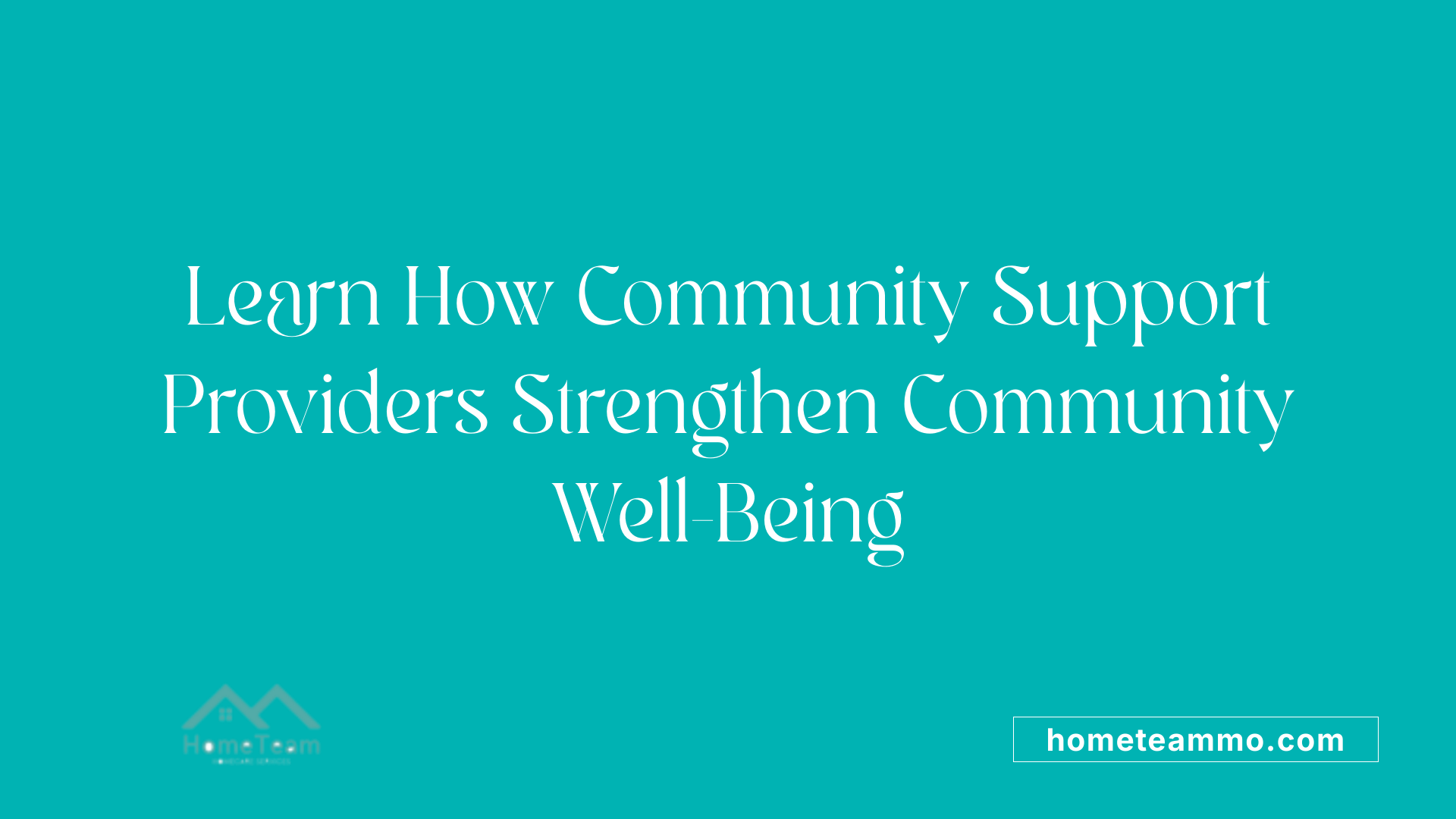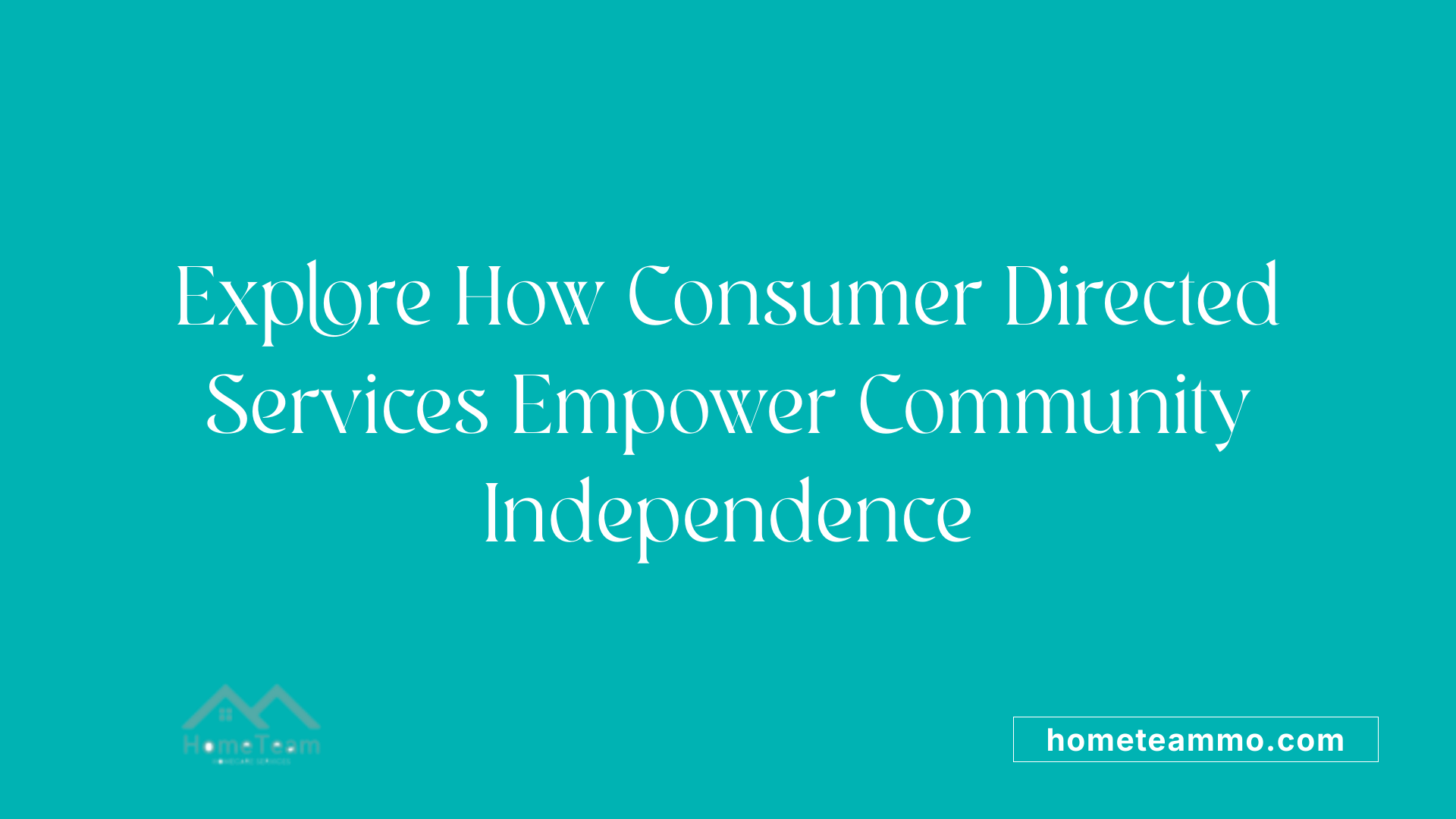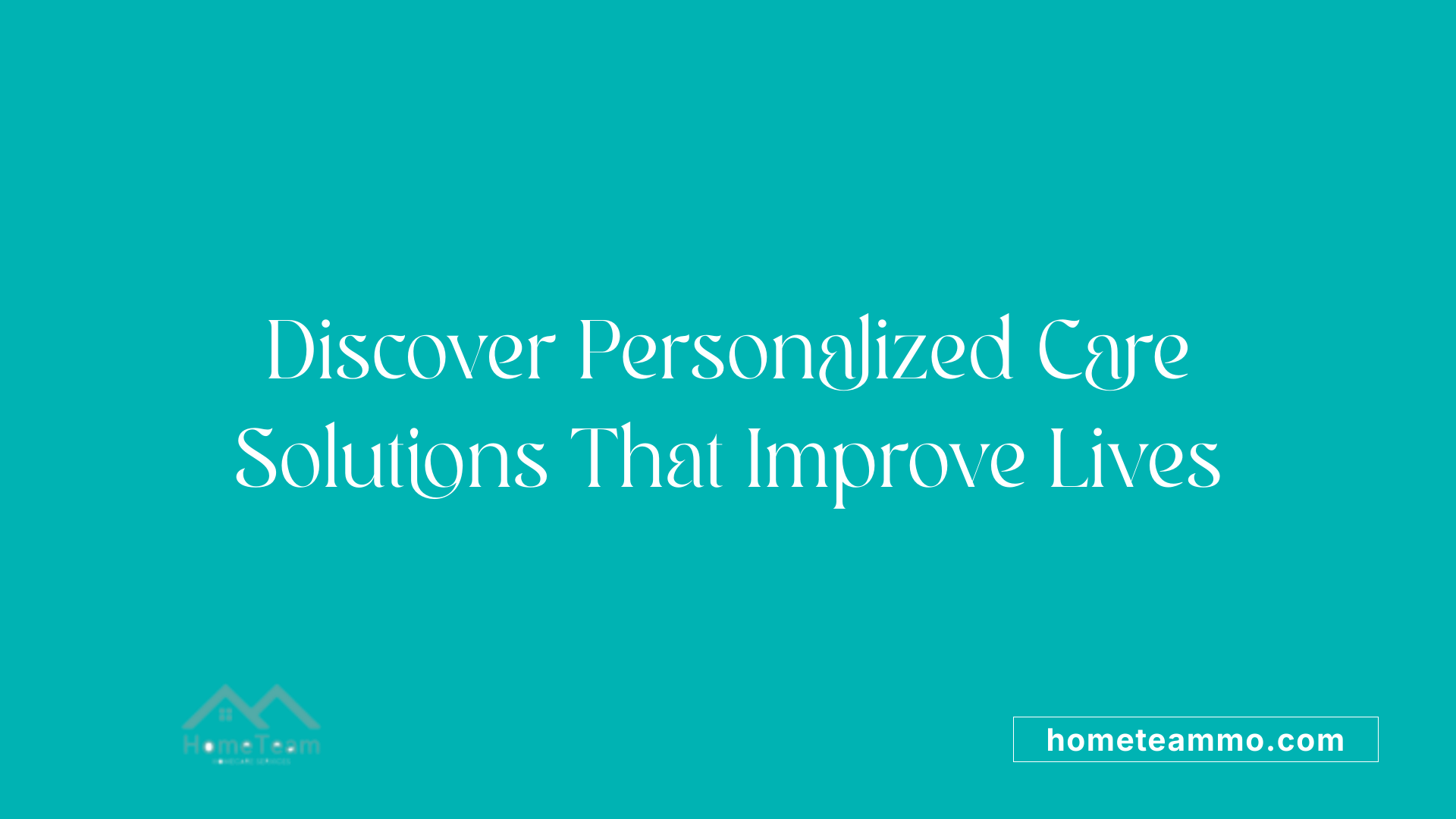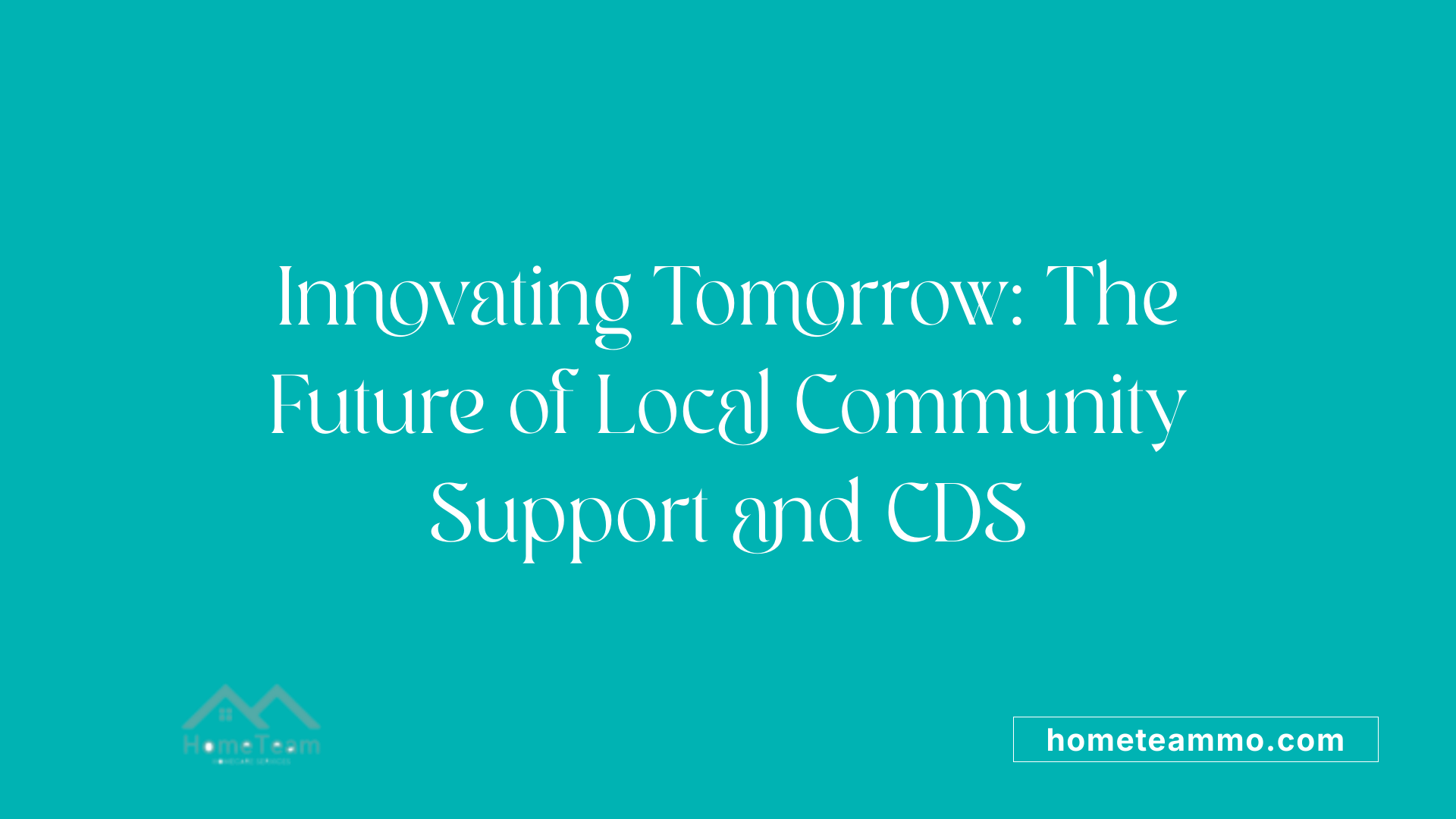Why Local CDS Providers Are Vital for Community Support
Empowering Communities Through Local Care Initiatives

The Critical Role of Local Community Support Providers in Enhancing Well-being
Local Community Support Providers, particularly through programs like Consumer Directed Services (CDS), are fundamental pillars that uphold the health, independence, and social cohesion of communities. These providers deliver essential, personalized services rooted in community-based care principles, fostering an environment where vulnerable populations can thrive. Recognizing their vital impact underscores the importance of supporting and expanding local caregiving initiatives to build healthier and more resilient neighborhoods.
Understanding the Core Functions of Community Support Providers

What is the role and significance of Community Support Providers in the community?
Community Support Providers (CSPs) are essential to fostering healthy, resilient, and inclusive communities. They deliver services that improve the health, stability, and overall well-being of individuals—especially those with disabilities or facing social and health challenges. These providers offer a variety of crucial services such as housing assistance, access to nutritious meals, mental health care, and programs that encourage social inclusion.
By addressing social determinants of health, CSPs help reduce stigma, improve mental health, and support social integration. They also promote peer support networks and educational initiatives, creating an environment where individuals feel valued and supported. Their efforts contribute markedly to community cohesion and help vulnerable populations—particularly marginalized groups and communities of color—build healthier, more connected lives.
What benefits do Community Support Providers provide for community well-being?
The services offered by CSPs significantly enhance overall community well-being. They help individuals maintain independence and stability through direct support with daily activities, mental health resources, and social engagement.
These services foster early intervention, recovery, and ongoing health management, which lead to better health outcomes and higher treatment adherence. CSPs also work actively to promote inclusive environments, reduce stigma around mental health and disability, and uphold human rights. As a result, communities become safer, more cohesive, and supportive, with residents experiencing greater life satisfaction and resilience.
How do Community Support Providers contribute to community health and independence?
CSPs play a vital role in promoting health and independence by providing services that tackle social factors influencing well-being, such as housing, nutritious meals, and personal care. They help individuals, including those with disabilities or at risk of homelessness, to maintain stable living conditions and effectively manage health conditions.
Providing additional supports like assistive technology, respite care, and community transition programs enables people to live independently and participate actively in their communities. The person-centered approach of CSPs emphasizes cost-effective interventions that improve quality of life while reducing reliance on intensive medical care.
Why is community-based caregiving and service delivery important?
Community-based care ensures support is accessible, culturally appropriate, and tailored to individual needs within local environments. These services help older adults and people with disabilities remain safely in their homes, promoting dignity and reducing unnecessary institutional stays.
Services like home care, transportation, and social programs foster independence and better health outcomes. They also facilitate collaboration among healthcare providers, community organizations, and trusted care allies such as community health workers.
By overcoming barriers such as lack of cultural sensitivity or awareness, community-based approaches ensure equitable access and support for all community members. They help prevent caregiver burnout and strengthen local support networks, aligning with goals to support aging in place and community resilience.
What impact do community-focused service programs have on local populations?
These programs generate broad positive effects—improving community health, safety, and social cohesion. They empower residents, reduce social isolation, and address underlying social issues such as crime or substance misuse.
Evidence shows that well-implemented community services can lower crime rates, enhance quality of life, and foster civic engagement and volunteerism. Moreover, they promote personal development, life satisfaction, and stronger social bonds, thereby contributing to long-term sustainability of healthy communities.
| Aspect | Impact | Additional Details |
|---|---|---|
| Health Outcomes | Improved general health, reduced hospitalizations | Focused on early intervention, ongoing wellness support |
| Social Inclusion | Reduced stigma, increased community participation | Peer programs and culturally sensitive services |
| Community Cohesion | Stronger neighborhood ties, reduced crime | Local collaboration and civic engagement |
| Personal Empowerment | Greater independence, improved quality of life | Tailored support, choice in services |
Overall, community-centered programs are fundamental in creating vibrant, supportive environments where all residents can thrive and maintain their independence.
The Mechanics of Consumer Directed Services (CDS) and Their Local Impact

Funding sources for CDS
Consumer Directed Services (CDS) programs are primarily funded through Medicaid, specifically via MOHealthNet, and supplemented by General Revenue. These funds support a wide range of services, including personal care, transportation, and home modifications. Local providers receive grants from the Division of Aging, emphasizing the importance of community-based support networks.
Eligibility criteria and participants' rights
To qualify for CDS, individuals must be Medicaid eligible, at least 18 years old, and able to direct their own care or have someone do so for them. They should have a physical disability, require a nursing facility level of care, and be capable of living independently with assistance.
Participants in CDS have the right to choose their caregivers, including family members (excluding spouses), and control the services they receive. They are responsible for recruiting, hiring, supervising, and replacing personal care attendants, ensuring a sense of independence and self-determination.
How CDS promotes independence and choice
CDS empowers consumers to live independently by allowing them to select caregivers and customize their care plans. This personalized approach enables in-home support with daily activities like personal care, meal preparation, and transportation.
The program also supports community integration by providing services such as environmental adaptations and specialized medical equipment. Transportation services help consumers access medical and community resources, further fostering independence.
What is the role and significance of Community Support Providers in the community?
Community Support Providers facilitate access to CDS and local resources by conducting preliminary screenings, guiding eligible individuals through assessments, and offering caregiver lists. They play a critical role in connecting consumers with personalized, community-based support.
How do Community Support Providers contribute to community health and independence?
These providers ensure that individuals receive appropriate services, enabling them to remain in their homes and actively participate in community life. By supporting community-based care, they help reduce reliance on institutional settings.
Why is community-based caregiving and service delivery important?
Community-focused services promote dignity, independence, and quality of life for individuals with disabilities or aging adults. Such services allow people to thrive within their communities, preserving social connections and reducing healthcare costs associated with institutional care.
| Aspect | Details | Impact |
|---|---|---|
| Funding | Medicaid (MOHealthNet), General Revenue | Ensures accessible, sustainable services |
| Eligibility | Medicaid eligible, 18+, capable of directing care | Guarantees participant rights and empowerment |
| Service Control | Choose caregivers, manage care plans | Promotes autonomy |
| Support Services | Personal care, transportation, environmental adaptations | Enables community living |
| Community Role | Screening, referrals, caregiver lists | Bridges individuals to community resources |
| Significance | Enhances independence, reduces institutional care | Improves quality of life and social integration |
Enhanced Quality of Life Through Personalized, Local Care

How does personalization of care in CDS programs improve the lives of individuals?
Consumer Directed Services (CDS) programs emphasize flexibility and self-determination, allowing individuals to select caregivers who best meet their specific needs and preferences. Participants can choose their own caregivers—be it friends, family members (excluding spouses), or professional providers—and decide on the types of services they want, such as personal care, meals, or transportation. This personalized approach fosters dignity, comfort, and a sense of control, enabling individuals to remain independent and maintain their routines.
What role do caregivers chosen by consumers play in their care?
In CDS programs, consumers are responsible for recruiting, hiring, supervising, and even replacing their personal care attendants. This empowerment promotes independence by giving individuals authority over who assists them daily. Caregivers can include family members, friends, or professionals from a registry, as long as they are not spouses. The ability to select and manage their caregivers helps consumers build trusting relationships and ensures their unique needs and preferences are prioritized.
How do services like transportation, medical equipment, and environmental adaptations support community living?
Beyond personal care, CDS programs offer additional services such as transportation to access community resources and medical appointments, environmental accessibility adaptations, and specialized medical equipment. These supports are essential in helping consumers live safely and independently in their homes or community settings. They ensure that individuals can participate in community life, maintain social connections, and attend to health needs without unnecessary reliance on institutional care.
How do Community Support Providers contribute to community well-being?
Community Support Providers (CSPs), which include local agencies and organizations, facilitate access to personalized home care, household chores, and medical services. They help set up and manage CDS programs by conducting assessments, referring eligible individuals, and providing caregiver lists. Their work ensures that services are tailored to local populations, strengthening community safety and support networks.
Why is community-based caregiving and service delivery vital?
Delivering care within the community keeps individuals connected to their social circles, environments, and routines. It promotes inclusion, prevents social isolation, and reduces the need for costly institutionalization. Community-based caregiving aligns with government policies that prioritize independence and community living for people with disabilities or aging adults, ultimately supporting healthier, more resilient communities.
| Service Type | Supported Populations | Benefits | Funding Source |
|---|---|---|---|
| Personal Care & Attendant Services | Disabled individuals & older adults | Independence, self-care, dignity | Medicaid (MOHealthNet) |
| Transportation | All eligible CDS consumers | Access to medical and community resources | Medicaid, local grants |
| Environmental Adaptations | Older adults, people with disabilities | Safe, accessible living environments | Medicaid, local programs |
| Medical Equipment & Supplies | People with medical needs | Improved health and safety | Medicaid |
This community-focused approach enhances overall well-being, supports aging in place, and fosters a resilient, inclusive society.
The Future of Local CDS Providers and Community Support

What impact do community-focused service programs have on local populations?
Community-focused services like Consumer Directed Services (CDS) programs significantly enhance the quality of life for local residents with disabilities and older adults. By enabling individuals to receive personalized care at home, these programs promote community integration and independence. They help reduce reliance on institutional care, fostering a sense of empowerment and self-determination.
When people can choose their caregivers and tailor their care plans, it leads to higher satisfaction and better health outcomes. Moreover, by supporting community living, these programs maintain social connections and engagement, positively influencing mental health.
Why is community-based caregiving and service delivery important?
Community-based caregiving is vital because it prioritizes the individual’s preferences and autonomy. Unlike facility-based care, home and community services allow individuals to remain in familiar surroundings, promoting dignity and comfort.
This approach also alleviates pressure on institutional healthcare facilities, making care more sustainable and accessible. The flexibility in scheduling and caregiver choice ensures that diverse needs are met, whether physical, mental, or emotional.
How do Community Support Providers contribute to community health and independence?
Providers like Paraquad play a crucial role by facilitating access to CDS programs, conducting assessments, and guiding individuals through the process of recruitment and care planning. They serve as vital links between consumers and local resources.
By managing outreach, education, and support services, these providers help build resilient, healthier communities. They empower individuals to manage their own care effectively, fostering independence and strengthening the overall community fabric.
Future aspirations for community-based CDS programs
Looking ahead, innovations in technology and care coordination hold promise for expanding access and improving quality. Telehealth, mobile app management, and remote monitoring can enhance service delivery.
Efforts to increase inclusivity will focus on reaching underserved populations and simplifying enrollment processes. Strengthening local provider networks and integrating community-based services into broader healthcare systems will ensure sustainable growth.
Community support programs will continue evolving as essential elements of holistic health care, emphasizing independence, community engagement, and personalized care for all.
Building Resilient Communities Through Local Support
Investing in local CDS providers and community-based services is essential for fostering independent, healthy, and attached communities. These providers serve as the backbone of community support, offering personalized, accessible services that address social and health needs. By empowering residents—especially vulnerable populations—they help reduce reliance on institutional care, improve overall quality of life, and promote social cohesion. Strengthening local care infrastructure ensures sustainable community growth and innovation, creating environments where everyone can participate actively and thrive. As we look to the future, expanding and enhancing community-based support models will remain vital to building resilient, healthy communities for generations to come.
References
- Consumer Directed Services General Information
- The Basics of Consumer Directed Services - Access Personal Care
- Home Care Independence - NC DHHS
- What are consumer-directed services in Missouri? - Paraquad
- CDS — ILCSEMO
- Community Supports | Medi-Cal Transformation - CalAIM
- The Impact of Community Support in Behavioral Health
- The benefits and challenges of established peer support ...
- The role of community support in mental health - Mpowerminds

How to Plan for Long-Term Home Care Services

How Home Team Helps Families Make Informed Care Decisions

How Home Team's Caregivers Provide Peace of Mind for Families



